Politics
About Andrew Cusack
 Writer, web designer, etc.; born in New York; educated in Argentina, Scotland, and South Africa; now based in London.
Writer, web designer, etc.; born in New York; educated in Argentina, Scotland, and South Africa; now based in London. read more
News
Blogs
Reviews & Periodicals
Arts & Design
World
France
Mitteleuropa
Knickerbockers
Argentina
The Levant
Africa
Cape of Good Hope
Netherlands
Scandinavia
Québec
India
Muscovy
Germany
Academica
Monsieur Bayrou
Monsieur le président has appointed François Bayrou as Prime Minister of France – for how long, who knows.
It is worth revisiting the assessment of him the late Maurice Druon (1918-2009) published in the pages of Le Figaro in 2004:
Monsieur François Bayrou, a secondary character and destined to remain so, is remarkable only for his perseverance in undermining the higher interests of France. He eminently possesses what the English call ‘nuisance value’.
At what point did his self-image begin to cloud his judgement? Here is a Béarnais, the son of a farmer, who, gifted for studies, became an agrégé in classical literature. At twenty-eight, he took his first steps in politics by entering the office of Monsieur Méhaignerie, Minister of Agriculture. At the same time, he joined the centrist party that Giscard d’Estaing created to serve his personal elevation. This party, which participated in overthrowing General de Gaulle in 1969, would become the UDF.
Monsieur Bayrou settled there and prospered. He was elected general councillor in his native department, then regional councillor. He was also an advisor to Monsieur Pierre Pfimlin, to the presidency of the European Assembly. Monsieur Pfimlin was an excellent man in every respect, who exercised very high functions with rectitude. He had only one fault: he was a centrist, that is to say, like all centrists, he was mistaken about the hierarchy of values.
He is credited with having made Paris lose its status as the capital of Europe. Indeed, it was agreed between Adenauer and de Gaulle that the institutions of the European Community would have their headquarters nearby. A large complex would be built in the near Paris region. On this, Pfimlin, an Alsatian, intervened, proclaiming: “Strasbourg, Strasbourg… the link between France and Germany, between the two cultures… reconciliation… Strasbourg, a symbolic city!” Could Alsace be insulted? The Parisian project was shelved.
The move was well-intentioned, but it was a misjudgement.
Paris, a great metropolis of the arts and business, as well as an international communications centre, had all the attractions for Members of the European Parliament, diplomats, and civil servants; Strasbourg, beautiful but provincial, with limited entertainment and above all poorly served, requiring changes of plane to reach its often foggy aerodrome, exercised little charm on the new community population. If the monthly sessions of Parliament – at what cost and for how long? – continue to be held there, everything else, commissions and services, has moved to Brussels and it is Brussels that has become the administrative capital of the Union.
Let us return to Monsieur Bayrou, who is following a fairly typical political path. Elected to parliament, he quickly showed a ministerial appetite by making education issues a specialty. He founded and chaired a permanent group to combat illiteracy. A laudable program. Unfortunately, during the time he was Minister of National Education, illiteracy continued to increase and the general level of education continued to decline. Was it during this period that he experienced a somewhat excessive expansion of his ego?
It is said that one night he woke up the members of his cabinet, urgently summoning them to the ministry, to consult them on a vision he had just had of his presidential future. The anecdote has been circulated with too much insistence for there not to be, at its origin, some reality.
Why am I dwelling so long on Monsieur Bayrou, when we have concerns that seem to be of greater importance? It is because, not content with creating disorder in our domestic policy, he is currently acting contrary to the interests of France in the European Parliament.
Monsieur Bayrou is a candidate for the presidency of the Republic: we know that. He has made it known urbi et orbi and, stubbornness being in his nature, there is every reason to believe that he will be one for life. He also ran in 2002 and, having arrived at the back of the pack, with 6.8%, he immediately put on the jersey with the bib number marked 2007.
Assuring that he is part of the majority in the National Assembly in order to keep his electorate, he keeps his parliamentary group on the fringes, under the pretext of refusing corporatisation; he never stops criticizing the government’s actions, often using the opposition’s arguments, and only votes for it with his fingertips, when he does not abstain, visibly waiting for its fall. Beautiful political logic! This is what Monsieur Bayrou calls cultivating one’s difference. When one benefits from such great support, one ends up preferring adversaries.
His programme? It is made up of nothing but worn-out words and formulas that have become hollow from being used too much. It is as if we had returned to the “more just, more humane Republic” of thirty years ago. Everything ages – even demagoguery. […]
What a waste! And all in keeping. Those who stick around François Bayrou for career interests, like those who stay there out of personal loyalty, expose themselves to serious disappointments.
In politics, I have no other criteria than services rendered to the country.
Prince Talleyrand said: “Without wealth, a nation is only poor; without patriotism, it is a poor nation.”

Vote AR

The lush and verdant tree formed in the shape of the Netherlands grows from deep roots spelling out ‘AR’, the name of the main Protestant party — once led by Abraham Kuyper.
As Kamps and Voerman point out in their book on posters from the Dutch Christian-democratic tradition (in print / online), this poster is a “rather complicated allegorical representation”.
The Lithe Efficiency of the Old Constitution
There is a wonderful glimpse of the old days in the memoirs of the late Lord Waddington (1929-2017).
David Waddington was a Lancashire man who became a lawyer, Member of Parliament, Government Chief Whip, Home Secretary, peer of the realm, and eventually Governor of Bermuda. (In that final role, he was the last of the big dogs — all the ones since have been civil servants.)
The old British constitution — before New Labour’s ill-judged reforms — had a lithe efficiency in those days aptly reflected in quite how few people were employed by the highest court in the realm — and how unfussedly they were officed:
I had only been in the House for two days when I received a telephone call from the clerk of my Manchester chambers asking me if later in the week I was prepared to sit as a deputy County Court judge somewhere in London. This would allow my colleague Bob Hardy, who had contracted with the Lord Chancellor’s Department, to sit as a judge on that day, to take over a brief of mine, a libel action in Leeds.
At the eleventh hour someone pointed out that if I were to sit, my career as an MP would come to an abrupt end because as a result of the House of Commons Disqualification Act I would have disqualified myself from membership of the House, thereby precipitating another by-election. I was then begged by Bob to go and explain to the lady in the Lord Chancellor’s Department why he could not sit and why I had turned out to be an inappropriate replacement.
I set off and, after journeying along many corridors and ascending and descending many staircases, I eventually found a little old lady sitting alone in a tiny office at the bottom of a gloomy stairwell somewhere in the bowels of the House of Lords.
I apologised for troubling her and she said: ‘I can assure you it is no trouble. In fact I am delighted to see you. I have been in this office for thirty-five years and you are the first person who has ever visited me.’
Equality
I find that they’re not true without looking further than myself. I don’t deserve a share in governing a hen-roost, much less a nation. Nor do most people — all the people who believe advertisements, and think in catchwords, and spread rumours. The real reason for democracy is just the reverse. Mankind is so fallen that no man can be trusted with unchecked power over his fellows. Aristotle said that some people were only fit to be slaves. I do not contradict him. But I reject slavery because I see no men fit to be masters.
This introduces a view of equality rather different from that in which we have been trained. I do not think that equality is one of those things (like wisdom or happiness) which are good simply in themselves and for their own sakes. I think it is in the same class as medicine, which is good because we are ill, or clothes which are good because we are no longer innocent. I don’t think the old authority in kings, priests, husbands, or fathers, and the old obedience in subjects, laymen, wives, and sons, was in itself a degrading or evil thing at all. I think it was intrinsically as good and beautiful as the nakedness of Adam and Eve. It was rightly taken away because men became bad and abused it. To attempt to restore it now would be the same error as that of the Nudists. Legal and economic equality are absolutely necessary remedies for the Fall, and protection against cruelty.
But medicine is not good. There is no spiritual sustenance in flat equality. It is a dim recognition of this fact which makes much of our political propaganda sound so thin. We are trying to be enraptured by something which is merely the negative condition of the good life. And that is why the imagination of people is so easily captured by appeals to the craving for inequality, whether in a romantic form of films about loyal courtiers or in the brutal form of Nazi ideology. The tempter always works on some real weakness in our own system of values: offers food to some need which we have starved.
When equality is treated not as a medicine or a safety-gadget but as an ideal we begin to breed that stunted and envious sort of mind which hates all superiority. That mind is the special disease of democracy, as cruelty and servility are the special diseases of privileged societies. It will kill us all if it grows unchecked. The man who cannot conceive a joyful and loyal obedience on the one hand, nor an unembarrassed and noble acceptance of that obedience on the other, the man who has never even wanted to kneel or to bow, is a prosaic barbarian. But it would be wicked folly to restore these old inequalities on the legal or external plane. Their proper place is elsewhere.
We must wear clothes since the Fall. Yes, but inside, under what Milton called “these troublesome disguises,” we want the naked body, that is, the real body, to be alive. We want it, on proper occasions, to appear: in the marriage-chamber, in the public privacy of a men’s bathing-place, and (of course) when any medical or other emergency demands. In the same way, under the necessary outer covering of legal equality, the whole hierarchical dance and harmony of our deep and joyously accepted spiritual inequalities should be alive. It is there, of course, in our life as Christians: there, as laymen, we can obey — all the more because the priest has no authority over us on the political level. It is there in our relation to parents and teachers — all the more because it is now a willed and wholly spiritual reverence. It should be there also in marriage.
This last point needs a little plain speaking. Men have so horribly abused their power over women in the past that to wives, of all people, equality is in danger of appearing as an ideal. But Mrs. Naomi Mitchison has laid her finger on the real point. Have as much equality as’ you please — the more the better — in our marriage laws: but at some level consent to inequality, nay, delight in inequality, is an erotic necessity. Mrs. Mitchison speaks of women so fostered on a defiant idea of equality that the mere sensation of the male embrace rouses an undercurrent of resentment. Marriages are thus shipwrecked. This is the tragi-comedy of the modern woman; taught by Freud to consider the act of love the most important thing in life, and then inhibited by feminism from that internal surrender which alone can make it a complete emotional success. Merely for the sake of her own erotic pleasure, to go no further, some degree of obedience and humility seems to be (normally) necessary on the woman’s part.
The error here has been to assimilate all forms of affection to that special form we call friendship. It indeed does imply equality. But it is quite different from the various loves within the same household. Friends are not primarily absorbed in each other. It is when we are doing things together that friendship springs up— painting, sailing ships, praying, philosophising, fighting shoulder to shoulder. Friends work in the same direction. Lovers look at each other: that is, in opposite directions. To transfer bodily all that belongs to one relationship into the other is blundering.
We Britons should rejoice that we have contrived to reach much legal democracy (we still need more of the economic) without losing our ceremonial Monarchy. For there, right in the midst of our lives, is that which satisfies the craving for inequality, and acts as a permanent reminder that medicine is not food. Hence a man’s reaction to Monarchy is a kind of test. Monarchy can easily be “debunked”; but watch the faces, mark well the accents, of the debunkers. These are the men whose tap-root in Eden has been cut: whom no rumour of the polyphony, the dance, can reach — men to whom pebbles laid in a row are more beautiful than an arch. Yet even if they desire mere equality they cannot reach it. Where men are forbidden to honour a king they honour millionaires, athletes, or film-stars instead: even famous prostitutes or gangsters. For spiritual nature, like bodily nature, will be served; deny it food and it will gobble poison.
And that is why this whole question is of practical importance. Every intrusion of the spirit that says “I’m as good as you” into our personal and spiritual life is to be resisted just as jealously as every intrusion of bureaucracy or privilege into our politics. Hierarchy within can alone preserve egalitarianism without. Romantic attacks on democracy will come again. We shall never be safe unless we already understand in our hearts all that the anti-democrats can say, and have provided for it better than they. Human nature will not permanently endure flat equality if it is extended from its proper political field into the more real, more concrete fields within. Let us wear equality; but let us undress every night.
Election Day
While in the outer world the British people have been electing as their representatives, by the degrading process of universal suffrage, several hundred paid professional politicians, few of them owners of landed property, many of them positively base-born, in the closed world of this column a very different ceremony has been taking place.
In the dark, time-worn Gothic Hall of Assembly, amid crumbling tombs and carved symbols whose inmost meaning few can now read, the Great Feudatories of the Realm have been swearing fealty to the Regent, settling on their broad shoulders once more, for another year, the dreaming loads of Church and State.
In a thousand manors too, throughout the column, the Lesser Feudatories have been receiving the allegiance of village headmen bearing baskets of eggs, indigenous stones and symbolic flowers, of representatives of the craft-guilds – wood-carvers, arquebus-designers and organ-builders prominent as ever – and tenant farmers and yeomen, red-cheeked, bucolic figures in their holiday coats of decent frieze.
After these day-long, solemn ceremonies, rituals so intricate that none but the columnar heralds can understand them, high and low, through all their exact, foreknown, immutable degrees from the Regent to the humblest labourer, feel themselves united, confirmed once more, as the mighty order of society is confirmed.
In the outer world all is ephemeral, unstable, eddying and whirling this way and that in ceaseless, unreasonable change. Within, all is unchanging and unchangeable. As it was, as it is, as it will be, till Judgment Day.
Regnum, Ecclesia, Studium
The threefold division of the world
As such he might be expected to have ideas about the idea of a university, and he wrote about them in The Spectator in August 1983.
Mister Grimond (as he still was then, only just), suggested those interested in the subject “might turn to a lecture by Ronald Cant, sometime Reader in Scottish History in the University of St Andrews”:
[…]
A vital aspect of this tripartite organisation, as Cant says, was that each should serve and support the other. But the studium, while interacting with the regnum and ecclesia, must maintain its independence.
It was certainly the business of the studium to advance knowledge, but that was not to be the end of the matter. Knowledge was linked to public service. The learned man had a duty to the community as well as a right to pursue his intellectual quarry. In fact he pursued the quarry on behalf of the community.
The tripartite division of the world, although old-fashioned, seems to me a useful concept, emphasising that government, morality, and higher education are separate but intertwined.
It seems to me that if we expel the regnum and the ecclesia utterly from the world of the university we shall end up paradoxically with universities totally dependent upon the state… but as subservient as those in Rome.
The liberal spirit gave birth and sustenance to universities; if its progeny does not foster it in the regnum they may indeed end up as purely vocational colleges.
Gaullist California
A friend well conversant in my ongoing crusade to remind today’s centre-droit of the utility of the Gaullist experience writes in:
The Golden State once practised a very successful form of Cal-Gaullism, developing world-class infrastructure, research universities, new industries… and much of the place was solidly conservative.
Once upon a time, parts of Southern California (including Orange County) were deemed the most conservative places in America, from which Nixon, Reagan, and others sprang.
San Francisco, though still beautiful, is certainly now well past its prime; I remember that white tie and tails were still seen there regularly as late as the ’80s.
The Polish church in Los Angeles was built to serve the large number of Polish exile families (with fathers who were aerospace engineers trained in the RAF like mine) who came from the UK and Canada to work in what was then the world centre of the aerospace and defence industry — “the Gunbelt in the Sunbelt”.
Weiter vorwärts

The Situation in the Far East
A century-old geopolitical cartoon is updated for today
Tse Tsan-tai — or 謝纘泰 if you fancy — was by any standard a remarkable man. Born in New South Wales, this Chinese-Australian Christian was a colonial bureaucrat, nationalist revolutionary, constitutional monarchist, pioneer of airship theory, and co-founded the South China Morning Post — still one of the most prominent newspapers in the Orient.
Tse’s most important visual contribution was a widely distributed political cartoon usually known in English as ‘The Situation in the Far East’ or in Chinese as the ‘Picture of Current Times’ (below).

Crafted as a propaganda measure to warn his fellow Chinese of the designs of foreign powers, the cartoon depicts the perils facing the Middle Kingdom.
Japan, with its expanding navy, proclaims it will watch the seas with its ally, Great Britain. The Russian bear looms from Siberia, crossing the border into China. A British lion sprawls over the land, its tail tied up by the “German Sausage Ambitions” at Tsingtao. The French frog guards Indochina while the American eagle lurks from the Philippines.
Meanwhile, the Chinese figures show sleeping bureaucrats and carousing intelligentsia unresponsive to the external threats.

Now the exiled Hong Kong artist Ah To (阿塗) has updated ‘Situation’ to reflect the realities of 2022. (more…)
The Accident of Birth
A king is a king, not because he is rich and powerful, not because he is a successful politician, not because he belongs to a particular creed or to a national group. He is king because he is born.
And in choosing to leave the selection of their head of state to this most common denominator in the world — the accident of birth — Canadians implicitly proclaim their faith in human equality, their hope for the triumph of nature over political manoeuvre, over social and financial interest; for the victory of the human person.
— Fr Jacques Monet SJ FRSC
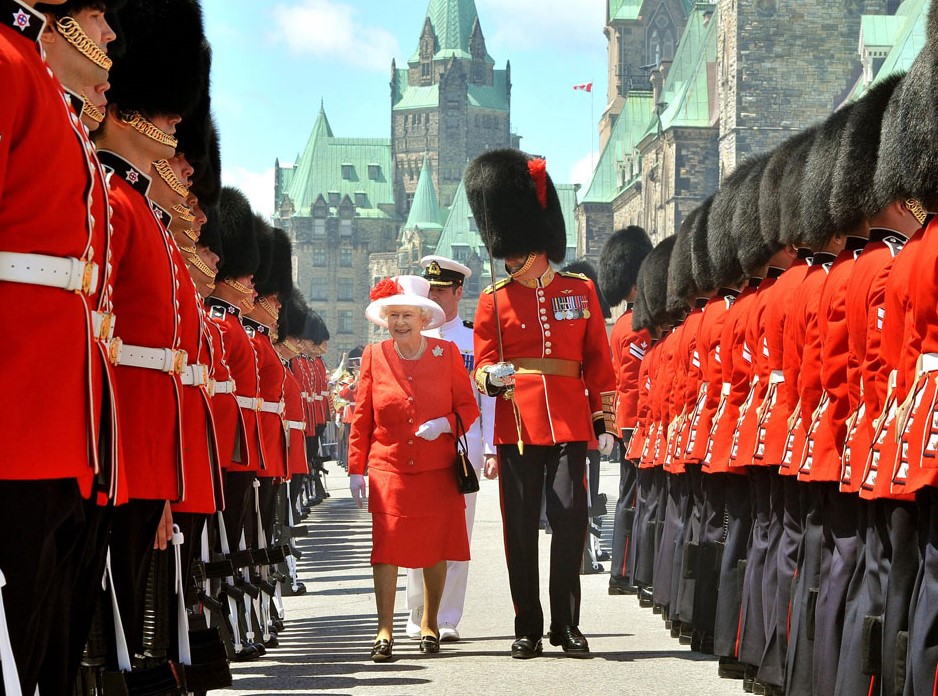
Anglo-Gaullist Reading Update
The latest round of news or commentary of Gaullist content or interest:
Mercator: Charles de Gaulle: a wise ruler of France
Financial Times: France invokes the golden age of de Gaulle
Politico: Why all French politicians are Gaullists
Variety: Cliché-Ridden ‘De Gaulle’ is Unworthy of Its Iconic Subject
Fifth Republic Britain
An Anglo-Gaullist Reading Round-up
While I’m a big Adenauer fan there’s little doubt that de Gaulle was the greatest European statesman of the twentieth century and an historical figure of such a position will always be the subject of interest.
Both Jonathan Fenby’s 2010 book The General: Charles de Gaulle and the France He Saved and Dr Sudhir Hazareesingh’s 2012 In the Shadow of the General: Modern France and the Myth of de Gaulle received wide notice, but neither as much as Julian Jackson’s 2019 A Certain Idea of France: The Life of Charles de Gaulle.
Jackson’s work is indeed magisterial and Lord Sumption’s praise of it as “the best biography of de Gaulle in any language” is only just an exaggeration. (For a strong bibliography of works on the general, see the appendix of Charles Williams’s 1993 The Last Great Frenchman: A Life of General de Gaulle.)
Study of the life and contradictions of de Gaulle is always worthwhile, but many spy a Gaullist moment in the Tory party’s refreshingly surprising turn away from ideological liberalism towards a more pragmatic conservatism under Boris Johnson.
Painting Johnson as Britain’s first Gaullist prime minister would be a stretch, but there is certainly some crossover: nationalist, economically interventionist, focused on national sovereignty and national exceptionalism.
■ Eliot Wilson pointed out this summer that Boris has always been difficult to classify in ideological terms.
■ Speccie political editor James Forsyth wrote in The Times that Boris the Gaullist puts action over ideas. Just before the party conference Forsyth also predicted the PM’s speech would be “in line with his recent Gaullist turn”.
■ QMUL’s Nick Barlow explores the parallels between de Gaulle’s Fifth Republic and Boris’s style of government.
■ Meanwhile Aris Roussinos argues that de Gaulle was always right in vetoing British entry into the EEC, and that true-blue FBPE types should welcome Brexit as advancing the cause of European integration.
■ Dean Godson (New Statesman) says that Defence Secretary Ben Wallace is pursuing “almost Gaullist trajectory for future British policy”.
■ When asked (on GB News) where he sits on the political spectrum, national treasure Peter Hitchens expressed his surprise that the Gaullist combination of “strong defence, patriotism, a strong welfare state, and national independence” isn’t more common in British politics.
■ ‘Bagehot’, the political column in The Economist, put it that the man who rebuilt post-war France has some important lessons for Britain’s prime minister: What Boris could learn from de Gaulle.
■ The American Conservative embarrassingly illustrated a piece on Europe’s Gaullist Revival with a picture of General Kœnig. (Always check the képi — as a brigadier general, de Gaulle only had two stars!)
■ Mike Bird discerned some Anglo-Gaullism in a pile of recent newspaper headlines.
■ As long ago as 2017 — what a world away that was! — Prospect argued in a somewhat rambling piece that the Brexiteers were Britain’s new Gaullists.
■ Honourable mention: Frederick Studemann chides Churchill and dumps de Gaulle, saying Boris should model himself on Bismarck and make for a Prussian Brexit.
But, for all this, when New Labour bigwig John McTernan suggested that Boris is not a Churchill but a de Gaulle, the great Julian Jackson himself pointed out there are still great differences between the PM and le général.
All the same, I’m welcoming our Anglo-Gaullist future with open arms.
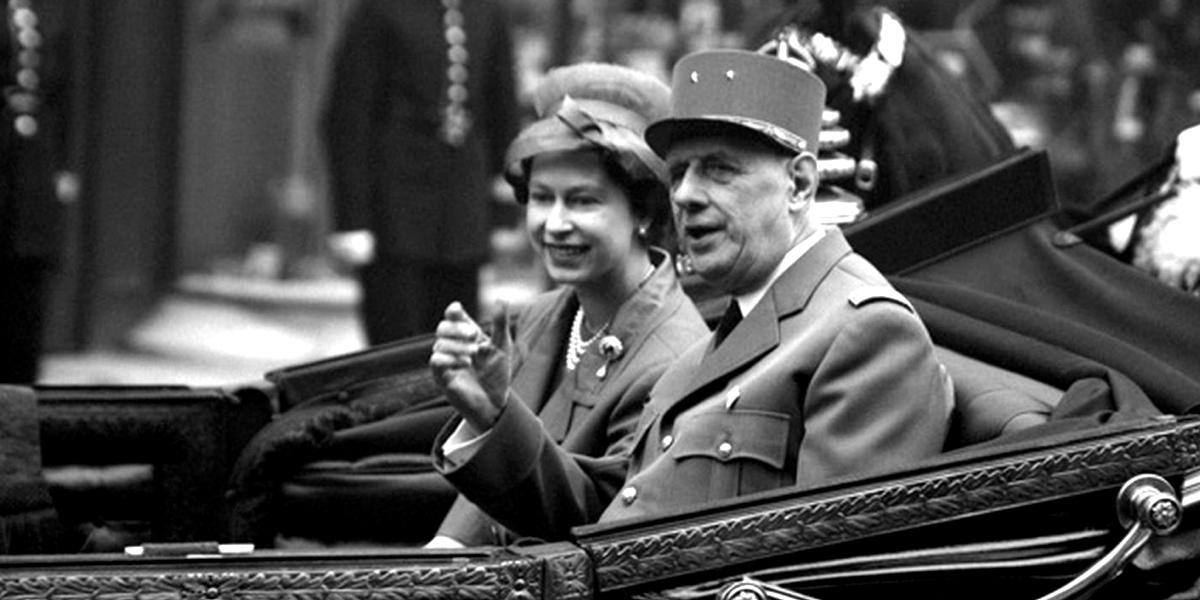
Articles of Note: 15.I.2021
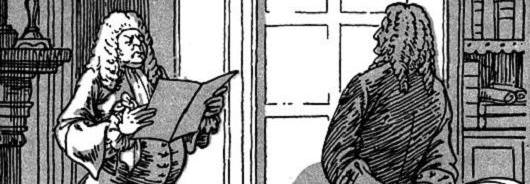
• Autumn and winter are a time for ghouls and ghosts and eery tales. At Boodle’s for dinner two or three years ago I sat next to the wife of a friend and exchanged favourite writers. I gave her the ‘Transylvanian Tolstoy’ Miklos Banffy, in exchange for which she introduced me to the English writer M.R. James — whose work I’ve immensely enjoyed diving into. The inestimable Niall Gooch writes about Christmas, Ghosts, and M.R. James, as well as pointing to Aris Roussinos on how Britons’ love for ghostly tales is a sign of (little-c) conservatism.
• There can be few figures in English history more ridiculous than Sir Oswald Mosley. But the Conservative MP who became a Labour government minister and then British fascist führer-in-waiting was also forceful in his condemnation of the savagery unleashed by the Black-and-Tans. In 1952 a local newspaper in Ireland announced that Sir Oswald and Lady Mosley “charmed with Ireland, its people, the tempo of its life, and its scenery” had taken up residence at Clonfert Palace in Co. Galway. “Sir Oswald,” the paper noted with amazing restraint, “was the former leader of a political movement in England.” Maurice Walsh presents us with the history of Mosley in Ireland.
• The death of the late Lord Sacks, Britain’s former Chief Rabbi, was the subject of much lament. Rabbi Sacks was obviously no Catholic, but his intellect, frankness, and generosity were much appreciated by Christians. Sohrab Ahmari, one of the editors at New York’s most ancient and venerable daily newspaper, offers a Catholic tribute to Jonathan Sacks.
• “Education, Education, Education” has become a mantra in the past quarter-century and while there is a point there’s also a certain error of mistaking the means to an end for the end itself. After all, in the 1930s Germany was the most and highest educated country in the world. At Tablet, probably America’s best Jewish magazine, Ashley K. Fernandes explores why so many doctors became Nazis.
• Fifty years ago the great people of the state of New York rejected both the Republican incumbent and a Democratic challenger to elect the third-party Conservative candidate James Buckley as the Empire State’s senator in Washington. At National Review Jack Fowler tells the gleeful story of the unique circumstances that brought about this victory for Knickerbocker Toryism and how Mr Buckley went to the Senate.
CDU @ 75

Last week was the seventy-fifth anniversary of the foundation of Germany’s Christian Democratic Union, one of the most successful democratic political parties in postwar Europe.
Indeed, under Adenauer the CDU was one of the institutions which transformed relations between the peoples of Europe and started the process of integration which, alas, has not aged well.
Nonetheless, here are some election posters from the early years of the CDU — plus one from the 1980s. (more…)
The politics of parliamentary colour
When Quebec’s « Salon bleu » was the « Salon vert »
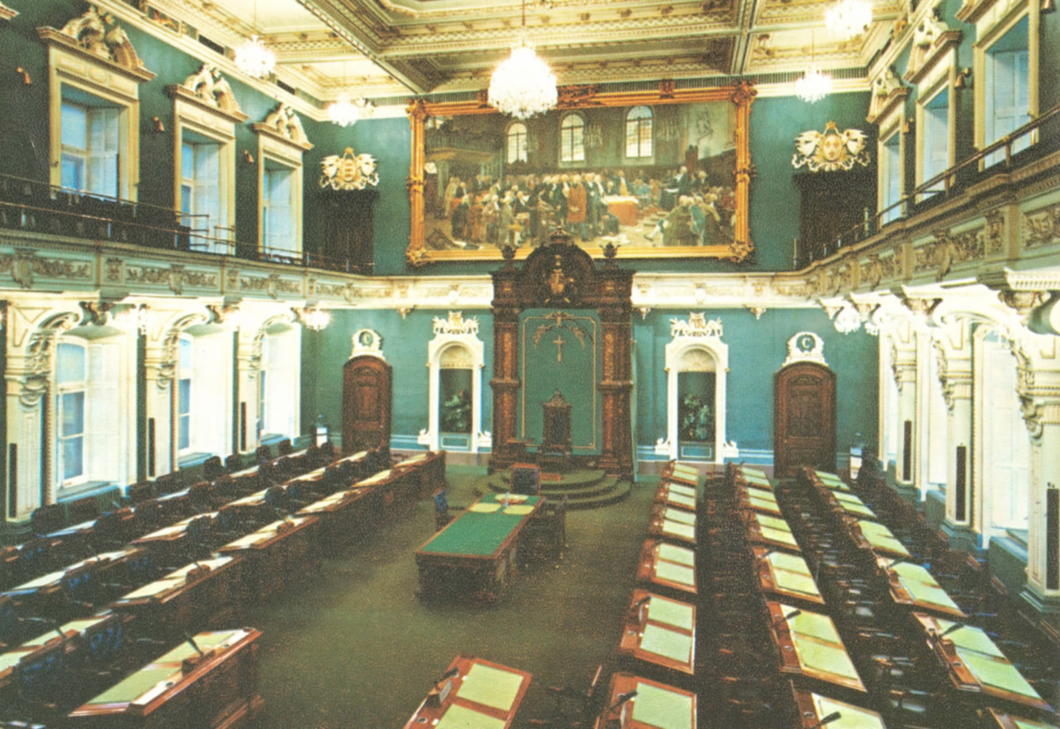
One Westminster tradition replicated in many times and places across the Commonwealth is a convention of colour: the lower house of a parliament is decorated in green, while the upper chamber is decorated in red. This reflects the green benches of the House of Commons and the red ones of the House of Lords.
Officially the plenary chamber of Quebec’s unicameral parliament is boringly the salle de l’Assemblée nationale but because of the colour of its walls it is more often known as the Salon bleu. One’s never surprised when Quebec bucks a trend or (more specifically) rejects an Anglo convention but it turns out the province’s plenary chamber did in fact used to be green until relatively recently.
When the members of the Legislative Assembly (as it then was) first convened in the Hôtel du Parlement in 1886 the walls were actually white. By the opening of the 1895 session the desks had been reappointed in green, but Le Soleil still made reference to the room as the “chambre blanche”. It was only in 1901 that the room was painted a “soft green” and the carpets and other furnishings changed accordingly. It even made an appearance in Alfred Hitchcock’s 1953 film “I Confess”.
From then the chamber was a Salon vert until 1978, when the decision was taken to begin broadcasting the proceedings of the Assemblée nationale.
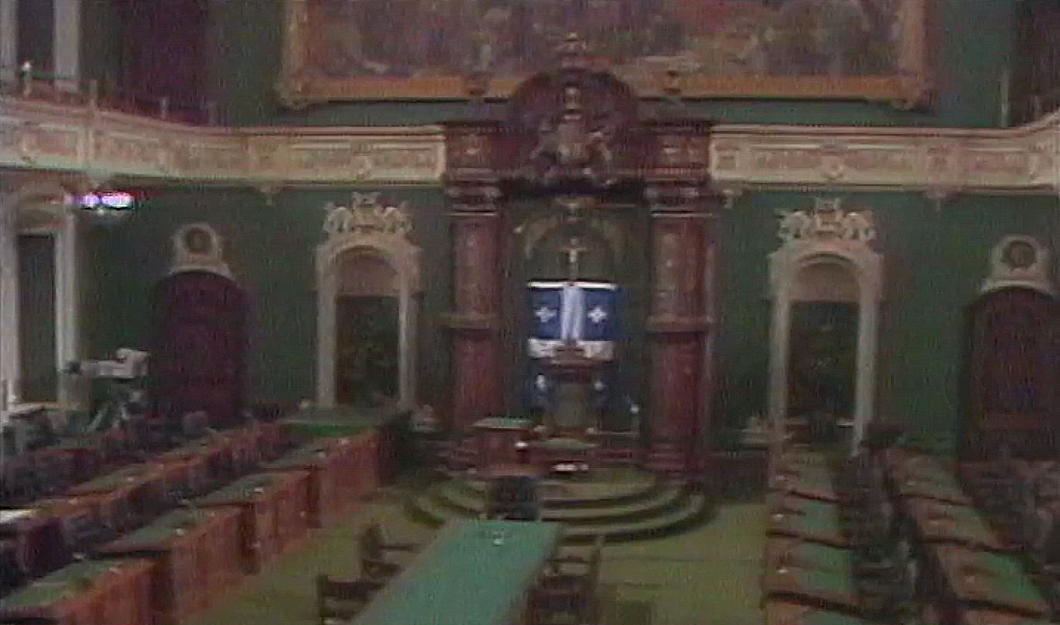
The television specialists complained that the dark green of the chamber was not visually conducive to the TV cameras available at the time and, looking at the evidence from the 1977 test session (above), one can see their point. Walls of either beige or blue were the options recommended in an official report, and unsurprisingly the national colour was chosen.
The historian Gaston Deschênes has mentioned the technical requirements of broadcasting also coincided with a desire to break with a “British” tradition. Certainly the government of the day, René Lévesque’s Parti Québécois, didn’t mind the change, while Maurice Bellemare — “the old lion of Quebec politics” and sometime leader of the old Union nationale — was deeply pleased that the chamber adopted the colour of Quebec’s flag.
So the walls were repainted sky blue and the furnishings changed accordingly, resulting in the Salon bleu we know today (below).
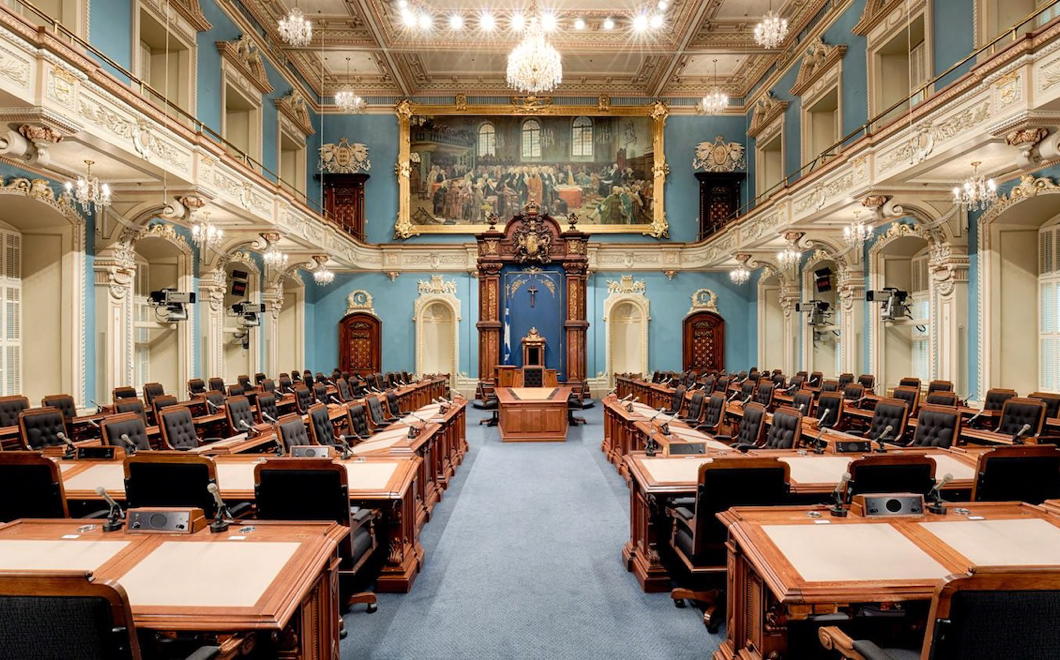
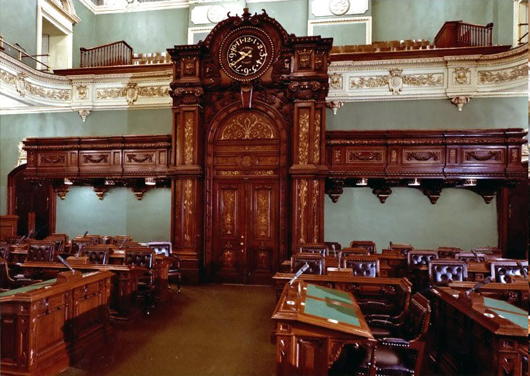
A tweet from the Assemblée’s official account shows two photos looking towards the chamber’s entrance from before (above) and after (below) it was made ready for television.
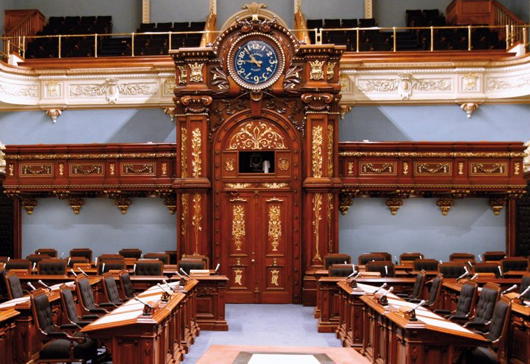
All the same, green is not universal amongst Commonwealth lower (or only) chambers. It’s not even universal in Canada: Manitoba joins Quebec in its azure tones while British Columbia’s is red-dominated.
Quebec was the last of Canada’s provinces to abolish its upper house, the Legislative Council, in 1968 (at the same time the lower house was renamed the National Assembly). The Legislative Council’s former meeting place is, of course, red, and the Salon rouge is used for important occasions like inductions into the Ordre national du Québec or the lying-in-state of the late Jacques Parizeau.
Turn the Ship Around
The UK’s Supreme Court is a nine-year experiment that has failed
If you open the hood of your car and mess about with the engine you can hardly be surprised if, later, it stops working at just the wrong moment. Likewise, constitutions by their very nature ought not to be fiddled with, and the current crisis in Westminster is ample proof.
Under the old system – before the Supreme Court and Fixed Term Parliaments Act – there would have been no crisis at all. The Prime Minister would see there is no working majority in favour of any way forward and would simply call a general election. Hypothetically, this would result in a government with a majority capable of moving business forward – all without much controversy.
Since FTPA was passed, however, the PM now needs a two-thirds majority in Parliament in order to bring about an election and the Opposition has up to this point blocked any chance at referring to the electorate in fear that the voters will back Boris over Corbyn. At the time it was passed, proponents argued not much would change with FTPA, as the point of the Opposition is to try and become the Government and what Opposition in its right mind would ever turn down the chance to fight a general election at a moment of crisis?
Enter now the Supreme Court in a timely intervention over the Prime Minister’s decision to end the longest parliamentary session on record by advising the Queen to prorogue Parliament over the long-planned conference recess. The Court has only been in operation since 2009, when it was created because legal experts and constitutional gurus told us it wasn’t correct for the highest court of appeal to technically be part of the legislature (even though this practice had been ratified by centuries of experience and had failed to present any difficulties).
The old system was robust and flexible; it is the innovation which has created stasis. Before it bent: now it breaks. Britain’s unwritten constitution is often summarised as “The Crown-in-Parliament is Supreme”. That means the Government exercises power with the authority of the Sovereign under the scrutiny of and with the confidence of Parliament. With the final court of appeal removed from the Parliament, where did that leave the Supreme Court? The justices have sought to answer with a judgement asserting that they are the ultimate authority in the land, supreme even over the exercise of the Royal Prerogative.
This runs contrary to the entire thrust of the UK’s constitutional development, which – up until this point – has been to strengthen scrutiny of the exercise of power and to increase the accountability of those who exercise that power. The Supreme Court’s judgement is a massive expansion of the justices’ own power without any counterbalancing accountability. When the Prime Minister exercises power he is held accountable by his need to maintain the confidence of his party colleagues and of the House of Commons. If he fails to do so he can be replaced as PM or ultimately his party can be chucked out by voters in a general election. How are Supreme Court justices to be held accountable though? What actions can voters take when justices overstep the bounds?
If justices seek to exercise political power than they must face concomitant levels of scrutiny and accountability that don’t – yet – exist. They cannot expect to receive the traditional obeisance and deference of politicians and the general public that the pre-Supreme Court judiciary received if they fail to observe the same self-restraint and respect for the Parliament’s role as legislature that the pre-Supreme Court judiciary observed.
The fundamental question is what the appropriate reaction of an ordered society is when judges overstep their bounds. If a Conservative majority government – presuming that is even the result of the next election – fails to respond appropriately to the Supreme Court’s ruling it is difficult to see how the UK can avoid going down the American route of a highly politicised judiciary. Ultimately, this would mean greater parliamentary oversight in the appointment of justices to the Supreme Court. Would they be prepared for long hearings in parliamentary committee rooms where every aspect of their past (including their student antics at university) were dredged before the public? Would voters be prepared to accept that an unaccountable Supreme Court can overturn any action of a democratically accountable executive or law passed by a democratically elected parliament with which the justices disagreed?
A Conservative majority government could easily, by simple Act of Parliament, remove the Royal Prerogative from the purview of the Supreme Court and further clarify (meaning restrict) the Court’s room for manoeuvre. But perhaps this isn’t a problem that can be fixed by tweaking. Trying to make sure justices understand they don’t have the authority to make naked power grabs seems impossible when you have an establishment that, in legal circles and otherwise, believes its will overrides the democratic mandate of the people in a constitutional monarchy. Restrictive legislation can help clarify, but it won’t strike at the heart of the institutional cockiness the Supreme Court exudes. (Remember that it ominously chose the Greek letter omega – symbolising finality – as its official emblem.)
Far better, then, to concede our own humility and accept that the Supreme Court has been a nine-year experiment which has failed. This would mean repealing those provisions of the Constitutional Reform Act 2005 which created Supreme Court in 2009 and going back to having Lords of Appeal in Ordinary sitting as the Appellate Committee of the House of Lords. There would be no problem with Law Lords continuing to sit in Middlesex Guildhall across Parliament Square as the Supreme Court does today.
Opponents must accept that the unaccountability the Supreme Court seeks to exercise belongs to another era: we live in the age of transparency, accountability, and taking back control.
History is littered with coups and grabs for power. Some succeed, others are attempted and fail. This “constitutional coup” can be foiled, but it requires a general election, a Conservative majority, and a government intent upon deliberate action.
The Steps of the Throne
Who may sit on the steps of the throne in the House of Lords?
Much was made of the Prime Minister’s decision to sit in the House of Lords when they were going through stages of the bill to invoke Article 50 last year. Theresa May had the right to sit on the steps of the throne in the Lords chamber by virtue of being sworn to the Privy Council, as all holders of the four Great Offices of State are (and usually their opposition Shadows as well).
But who else is granted the privilege of lodging their posterior in such a prominent locale?
The Companion to the Standing Orders and Guide to the Proceedings of the House of Lords provides some guidance:
1.59 The following may sit on the steps of the Throne:
· members of the House of Lords in receipt of a writ of summons, including those who have not taken their seat or the oath and those who have leave of absence;
· members of the House of Lords who are disqualified from sitting or voting in the House as Members of the European Parliament or as holders of disqualifying judicial office;
· hereditary peers who were formerly members of the House and who were excluded from the House by the House of Lords Act 1999;
· the eldest child (which includes an adopted child) of a member of the House (or the eldest son where the right was exercised before 27 March 2000);
· peers of Ireland;
· diocesan bishops of the Church of England who do not yet have seats in the House of Lords;
· retired bishops who have had seats in the House of Lords;
· Privy Counsellors;
· Clerk of the Crown in Chancery;
· Black Rod and his Deputy;
· the Dean of Westminster.
Fête Chiracienne
AS TODAY IS the eighty-fourth birthday of Monsieur Jacques René Chirac, I thought it’d be best to share a few images of the underappreciated fifth president of the Fifth Republic (not to mention sometime Mayor of Paris, Prime Minister of France, and Co-Prince of Andorra) doing the things he does best. (more…)
Party in the Overberg
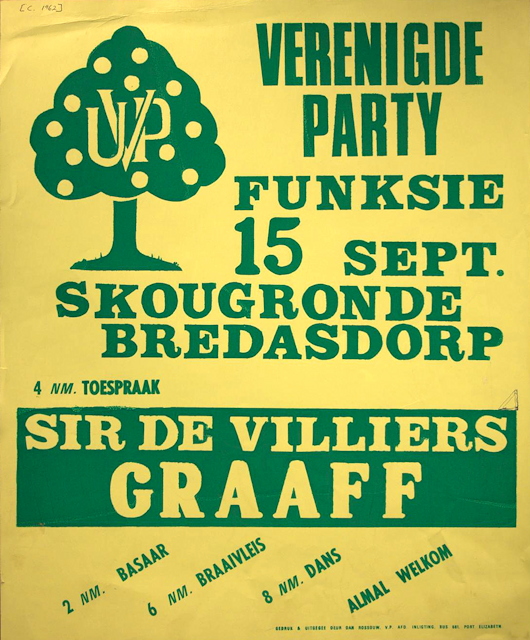
Alongside a bazaar, a braai, and dancing, a speech by Sir De Villiers Graaff is the selling point of this poster advertising a United Party (Verenigde Party) get-together in the beautiful Overberg region of the Cape.
“Sir Div” was the inheritor of one of only twelve South African baronetcies and led his party from 1956 until 1977 when it merged with the Democratic Party of verligte ex-Nationalists to form a new entity.
The broadly centrist party had lost power to the republican Nats (creators of apartheid) in 1948, and suffered splits that led to the creation of the Liberal Party and the United Federal Party in 1953, the National Conservative Party in 1954, and the Progressive Party in 1959.
The party’s emblem was a happy little citrus tree.
A Land, not a Republic
Bohemians seek to rename Czech Republic as ‘Czechia’
What are we to make of the growing movement against the name ‘Czech Republic’? It seems a welcome development, although one has a certain hesitancy in adopting the name ‘Czechia’ which somehow just doesn’t ring true from the English tongue.
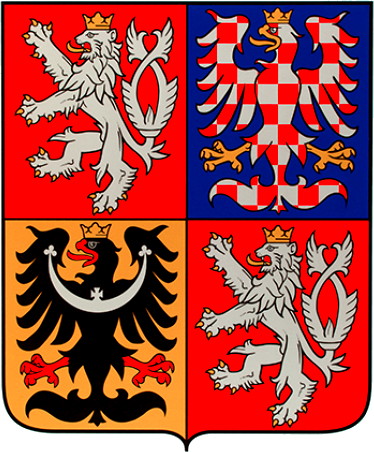 Many will still automatically recall ‘Czechoslovakia’, an artificial country invented in 1918 which lasted a surprising seventy-four years. Its two successor states will celebrate their twenty-fifth anniversary of independence next year, and perhaps this landmark event has provoked some introspection regarding the country’s name.
Many will still automatically recall ‘Czechoslovakia’, an artificial country invented in 1918 which lasted a surprising seventy-four years. Its two successor states will celebrate their twenty-fifth anniversary of independence next year, and perhaps this landmark event has provoked some introspection regarding the country’s name.
It’s not that the Czech Republic is alone: there are plenty of countries whose official names included an adjectival demonym — the French Republic, the Italian Republic, and the Hellenic Republic spring to mind. But these three examples all have names that more readily spring to mind — France, Italy, Greece — and which are used more frequently then the official state names.
Besides the Czech Republic, the only other example of a country known only as ‘the [demonymic adjective] Republic’ is the Dominican Republic, which cannot be known as Dominica owing the nearby sovereign island of the same name. (The island Dominica was named after Sunday whereas the DR was named after Saint Dominic, the patron of its largest city.) Even the Central African Republic is often referred to as Centrafrique (in French, at least).
Is it a move against republicanism? Not especially. When neighbouring Hungary adopted its new constitution it dropped the state name ‘Hungarian Republic / Republic of Hungary’ in favour of just plain ‘Hungary’ while maintaining a republican form of government. More influential perhaps is that it’s often viewed as a bit tinpot-dictatorship to have the word ‘republic’ in your country’s everyday name. (more…)
Search
Instagram: @andcusack
Click here for my Instagram photos.Most Recent Posts
- Articles of Note: 27 January 2025 January 27, 2025
- Spooks’ Crown January 23, 2025
- Jesuit Gothic January 23, 2025
- Christ Church December 29, 2024
- A Christmas Gift from the Governor December 24, 2024
Most Recent Comments
Book Wishlist
Monthly Archives
Categories


